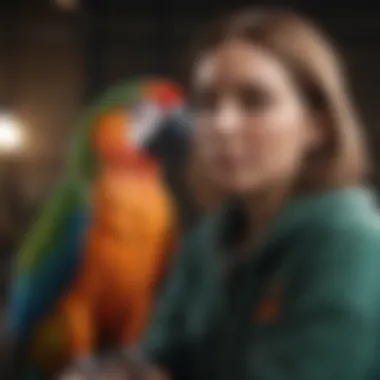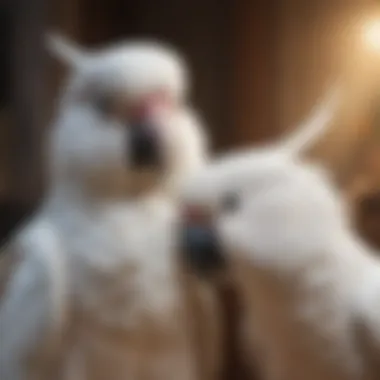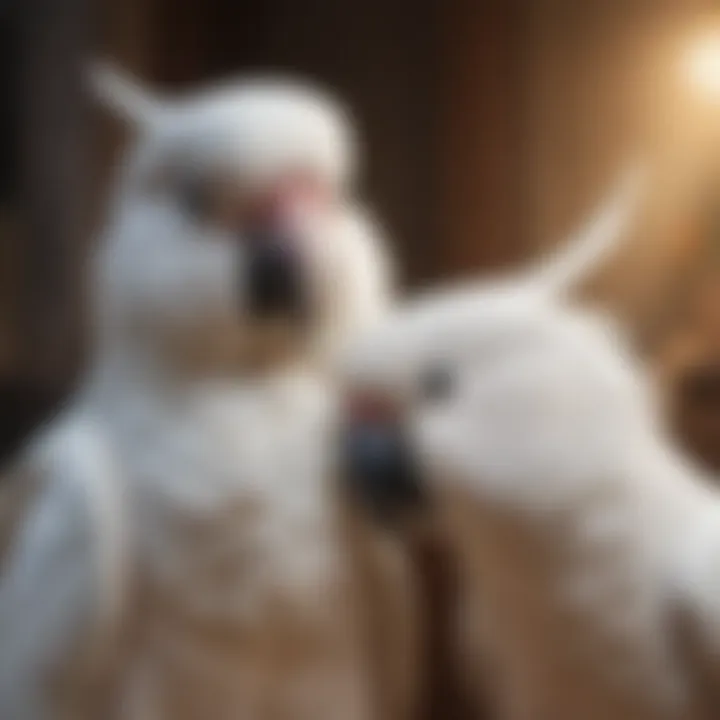Exploring Pet Bird Loyalty: Avian Bonds Uncovered


Intro
Understanding the loyalty exhibited by pet birds is critical for those who cherish these creatures as companions. Loyalty in avian species varies greatly and can be shaped by numerous factors including social interactions, environmental conditions, and the bond formed with their human caregivers. By elucidating these nuances, pet bird owners can appreciate the depth of their bird's loyalty, enhance their relationships, and ultimately foster a more fulfilling companionship.
This article aims to dissect the complexities surrounding pet bird loyalty. It explores behavioral studies, species differences, and practical tips to strengthen the avian-human bond. Insights into daily care and nutritional needs will also be discussed, along with wellness considerations relevant to the health and happiness of pet birds.
As we dive into these various topics, our goal is to create a comprehensive resource for all pet bird enthusiasts. Whether you are an aspiring bird parent, an experienced owner, or even a breeder, understanding loyalty in pet birds offers invaluable insights into these complex creatures.
Understanding Bird Loyalty
Understanding bird loyalty is essential for those who seek a deeper connection with their pet birds. It provides insight into how these avian creatures perceive relationships and how they form bonds with humans. Grasping the concept of loyalty can enhance interaction and care strategies for bird owners, leading to improved well-being for the birds and satisfaction for the owners.
One significant aspect is recognizing that loyalty may not resemble human emotions. Instead, it tends to reflect a particular behavioral pattern shaped by natural instincts and social needs. By understanding these dynamics, pet bird owners can create an environment that fosters healthy attachments. This knowledge enhances the human-bird relationship and supports the bird's overall health.
A keen awareness of bird loyalty aids in addressing behavioral issues, as understanding the root cause of a bird's actions can help in their management. Recognizing what loyalty entails can lead to better communication, which is paramount in sharing a home with another sentient being, albeit of a different species.
Defining Loyalty in Avian Context
Loyalty in the context of birds refers to more than mere attachment. It encompasses a set of behaviors and responses that indicate a bond or preference for a particular companion, whether human or avian. Avian loyalty often manifests through vocalizations, body language, and specific actions such as preening or feeding proximity.
Birds exhibit loyalty to their mates or caregivers, often forging connections that go beyond immediate survival needs. This loyalty can be seen in species that live in social groups, where they often show preference to certain members within their flock. The depth of loyalty can vary based on the species, age, and individual temperament of the bird.
Comparative Loyalty in Animals
In the wider animal kingdom, loyalty takes various forms across different species. Many animals, such as dogs, showcase straightforward loyalty defined by attachment to their human companions. This attachment is often grounded in deep emotional connections and mutual dependence.
Conversely, birds demonstrate a nuanced version of loyalty that is influenced by their evolutionary background and social structures. In comparing birds to other animals, it becomes evident that loyalty in birds can be of a different nature. For instance, certain bird species may prioritize social interactions over personal attachment, indicating that loyalty may not always translate into a single bond.
This distinction is crucial for bird owners, as it shapes expectations in their relationships with their pets. By understanding how avian loyalty intersects with behaviors seen in the broader animal realm, bird owners can foster an environment that respects their bird's instincts while nurturing trust and connection.
The Social Structure of Birds
The social structure of birds plays a significant role in understanding their loyalty and behavior. Birds are not solitary creatures; they often live in social groups that influence their interactions and relationships. This section explores the various aspects of avian social structures, providing valuable context for pet bird owners.
Understanding Flock Behavior
Flock behavior is a fundamental characteristic of many bird species. When birds come together in a flock, they benefit from increased safety, enhanced foraging opportunities, and improved social interactions. In a flock, individual birds can communicate and share information about food sources or predators. This communication fosters strong bonds among flock members and creates a sense of community.
Birds in a flock often exhibit synchronization in their movements, which can be seen during flight. This coordination is not only essential for evading predators but also indicates a level of trust among the birds. For a pet bird owner, understanding flock dynamics can help in creating a stable environment. If a bird feels safe among its companion birds or humans, its loyalty and affection are likely to strengthen over time.
Hierarchy and Relationships
Among birds, hierarchies are commonplace and play a crucial role in establishing social order. In many species, a dominant bird leads the flock, while others follow. This hierarchy can influence everything from feeding to mating behaviors. Birds often develop complex relationships based on these hierarchies. Dominance is not merely about aggression but involves subtle cues and behaviors. Recognizing these social cues can be instrumental for pet owners in fostering positive interactions between birds.
Understanding hierarchy can also impact how birds relate to their human caregivers. A strong bond may develop when pet birds perceive their owners as part of their social structure. Owners who understand their bird's social dynamics can create a nurturing environment that respects these relationships. Such awareness not only promotes loyalty but supports the overall well-being of pet birds.
"The foundation of a bird's social behavior significantly influences its bonding capabilities and emotional health."
By being attentive to these social structures, bird owners can enhance their bond with their pets. Recognizing the importance of flock behavior and hierarchy provides insights into how to approach training, socialization, and daily interactions.
Species-Specific Insights
Understanding species-specific insights is essential in exploring the loyalty of pet birds. Different bird species exhibit varied social behaviors and bonding patterns which influence how loyalty manifests in individual birds. Some species are known for their strong attachments to their owners, while others might display more independent behaviors. This knowledge aids pet bird owners in cultivating a deeper connection with their feathered companions.


The benefits of comprehending these insights include better management of bird behavior and improved owner expectations. By recognizing the unique characteristics of their pets, owners can tailor their interaction approaches to fit specific species needs. This understanding can foster a more harmonious relationship that is predicated on mutual appreciation and care. Additionally, knowledge of species loyalty trends can help in addressing potential behavioral issues such as aggression or anxiety in birds, leading to a more satisfied pet and owner alike.
The following sections delve into specific species to highlight their loyalty traits in detail.
Key Factors Influencing Loyalty
Understanding the factors influencing loyalty in pet birds is essential for owners who wish to cultivate a strong bond with their feathered companions. Loyalty is not merely an abstract notion; it has tangible elements that can greatly enhance the relationship between birds and their owners. This section discusses the specific aspects that contribute to loyalty, focusing on socialization, environment, and routines, which offer benefits to both birds and their human caretakers.
Bonding Through Socialization
Socialization plays a critical role in establishing loyalty among pet birds. When birds interact with their owners, they develop trust and understanding. Socialization can take many forms, from casual handling to dedicated playtime. Engaging your bird on a regular basis helps to reinforce the bond you share.
- Positive Interaction: Encourage constructive interactions by using gentle voices and patient handling.
- Varied Activities: Introduce different games or toys to keep your bird mentally stimulated and interested in spending time with you.
Research shows that a well-socialized bird is more likely to display loyalty traits, such as seeking closeness and following their owner around the house. This bonding creates an emotional attachment that can lead to deeper loyalty behaviors.
Impact of Environment on Loyalty
The environment in which a pet bird lives directly influences its behavior and loyalty. Birds are sensitive creatures, and the conditions of their surroundings can significantly affect their emotional state. A suitable, enriched environment can foster a sense of security and belonging.
- Safety and Comfort: Ensure that your bird feels safe by providing a stable and secure space. Avoid loud noises and sudden movements that can cause stress.
- Enrichment: Incorporate various items in their habitat like perches, toys, and climbing structures. This promotes exploration and reduces boredom, which is beneficial for loyalty.
Since birds perceive their environment differently than humans, their emotional well-being relies on factors broadly interpreted from their experiences. A loving environment is more likely to yield a loyal companion.
Consistency and Routine
Establishing consistency and routine in a bird's daily life also plays a substantial role in developing loyalty. Birds thrive on predictability, as it helps them feel more secure. By creating a daily schedule, you can help your pet bird know what to expect, which builds their trust in you.
- Feeding Schedule: Provide meals at the same time each day to help your bird anticipate feeding and build a sense of security around you.
- Interaction Routine: Set aside specific times for interaction, whether through training, petting, or play. This regular contact reinforces the bond.
"Consistency in care not only enhances a bird's happiness but is a cornerstone of loyalty."
By paying attention to these factors, pet owners can significantly improve their relationships with their birds, leading to a rewarding companionship rooted in loyalty.
Interpreting Bird Behavior
Understanding how birds communicate and interact is essential for pet owners. Interpreting bird behavior plays a significant role in deciphering their emotions and overall well-being. By paying attention to vocalizations and body language, pet owners can foster stronger bonds with their feathered companions. This knowledge empowers owners to make informed decisions that enhance their birds' daily experiences, promoting loyalty and affection.
Understanding Vocalizations and Body Language
Birds have a unique way of expressing themselves through vocalizations and body language. Vocalizations can range from chirps, whistles, and songs, each carrying different meanings. For instance, a parrot may vocalize loudly when excited or scared, while soft chirping can signal contentment. Owners should observe these sounds closely to gauge their birds' moods. Moreover, it is essential to recognize that vocal patterns can vary considerably depending on the species.
Body language complements vocalizations. Movements such as head bobbing, wing flapping, or tail feather positioning are key indicators of a bird's emotional state. A relaxed posture with relaxed feathers often signifies comfort, while puffed-up feathers may suggest fear or aggression. By learning these signals, owners can effectively respond to their birds' needs, nurturing trust and loyalty.
Signs of Affection and Attachment
Just as humans express affection in various ways, so do birds. Signs of affection can be quite subtle, but recognizing them is crucial for reinforcing bonds.
- Preening: Birds often preen each other in the wild as a form of social bonding. If a pet bird preens its owner or another bird, it indicates trust and affection.
- Vocal Mimicry: Some species, like African Grey parrots, may mimic their owners' voices or chatter as a form of social interaction, signifying attachment.
- Physical Proximity: A bird that seeks to stay close, whether perched on a shoulder or resting beside an owner, shows a strong bond. This behavior is a clear sign of loyalty.
- Mutual Play: Engaging in playtime activities strengthens the bond between bird and owner. Birds that initiate play, whether with toys or humans, demonstrate attachment.
Building a rapport based on understanding vocalizations and affectionate behaviors fosters a deeper loyalty.
Building a Bond with Your Bird
Creating a strong bond with a pet bird is foundational to its happiness and well-being. This bond goes beyond mere ownership; it involves mutual trust and respect. A well-established relationship can lead to a more fulfilling life for both the bird and the owner. Pet birds are social creatures, and they thrive on interaction. A robust bond ensures that the bird feels secure and valued in its environment.


Birds communicate their feelings and needs differently than humans. Understanding these cues is vital. When owners actively engage with their birds, they foster loyalty and companionship. This section explores techniques and methods to enhance the bird-owner relationship and emphasizes the long-term benefits of such efforts.
Techniques to Enhance Loyalty
- Consistent Interaction
Regular interaction enhances the bird's comfort level. Spend time talking, singing, or simply being present near the bird. This creates familiarity, helping the bird to recognize you as a safe presence. - Positive Reinforcement
Utilize treats and praise when your bird displays desired behaviors. This method reinforces the bond and builds trust. Over time, the bird will associate your presence with positive experiences. - Environment Enrichment
Providing toys and activities will keep your bird engaged. A mentally stimulated bird is less prone to stress, which enhances its loyalty. Rotate toys and activities to maintain the bird's interest and curiosity. - Routine Establishment
Birds feel secure in predictable environments. Establish feeding, playtime, and interaction routines. Consistency helps the bird understand what to expect, building a deeper trust. - Learn and Respond to Signals
Each bird has unique signals for affection and distress. Learn these signals to understand their needs better. Respond to their vocalizations or body language promptly to show that you care.
"Understanding your bird's signals can transform your relationship and lead to profound loyalty."
The Role of Training in Bonding
Training is often viewed solely as a method to teach birds tricks. However, it plays a more significant role in building bonds. Effective training fosters communication between the bird and the owner. It encourages birds to engage with humans in various ways, reinforcing the trust between them.
- Basic Commands
Start with simple commands like "come" or "step up." Short training sessions will develop obedience and trust. Over time, these sessions can become a fun bonding experience. - Positive Association
Integrate training with rewards. Offering a treat when the bird performs well reinforces the idea that being near you is rewarding. This association strengthens loyalty as the bird begins to look forward to training sessions. - Gradual Introduction of Challenges
Gradually increase the complexity of the tasks as the bird becomes more comfortable. This approach keeps the bird engaged and showcases your commitment to its growth. - Patience and Consistency
Training requires time and effort. Patience is crucial; avoid rushing the process. Consistency in training reinforces behavior and enhances loyalty over the long run.
In summary, both bonding techniques and training are essential for enhancing loyalty in pet birds. These methods not only nurture a strong relationship but also create an environment where birds feel secure and understood.
Practical Implications for Bird Owners
Understanding the loyalty of pet birds is crucial for bird owners. This knowledge not only helps in fostering a deeper bond with their feathered companions but also enhances the overall well-being of the birds. Recognizing how to nurture a loyal relationship allows owners to create an enriching environment that meets their pet's emotional and physical needs. In providing emotional understanding, rearranging the living space, and facilitating proper social interaction, owners can unlock the potential for loyalty and affection from their birds.
Creating a Nurturing Environment
A nurturing environment is essential for the development of a loyal bond between pet birds and their owners. The space where birds live directly impacts their psychological and emotional state. Therefore, bird owners should focus on several key aspects:
- Physical Space: The cage should be spacious enough for birds to move freely. Including perches, toys, and places to hide can foster mental stimulation.
- Social Interaction: Birds are social creatures. Encouraging interaction either with other birds or humans can enhance their well-being.
- Cleanliness: A clean environment reduces stress and illness. Regular cleaning prevents the build-up of harmful bacteria.
- Variety in Diet: Offering a diverse diet that incorporates fruits, vegetables, and specialized bird food keeps birds healthy and engaged.
By ensuring that the living space is conducive to their well-being, owners can create a secure atmosphere that promotes trust and loyalty.
Recognizing and Responding to Your Bird's Needs
Birds communicate their needs through various signals. Understanding these cues is vital for developing a strong bond. Owners should pay attention to:
- Vocalizations: Different sounds can indicate happiness, distress, or a need for attention. Learning the meaning behind these sounds can improve communication.
- Body Language: Observing their posture, feather movement, and eye expression can provide insights into their emotional state. For example, an excited bird may flap its wings or approach eagerly.
- Behavioral Changes: Changes in routine or social behavior might indicate stress or dissatisfaction. Being responsive to these changes can prevent long-term issues and reinforce trust.
- Health Monitoring: Physical health impacts emotional well-being. Regular check-ups with an avian veterinarian are essential for physical adjustments based on health changes.
Recognizing these needs not only nurtures the bond of loyalty but also ensures that pet birds live fulfilling lives.
Loyalty is a reciprocal relationship. By understanding and responding to your bird's needs, you solidify the trust that strengthens your bond.
By adopting these practical implications, bird owners can create a loyal and affectionate relationship, benefiting both themselves and their pets.
Species Loyalty Variance
Understanding the nuances in loyalty among different species of birds is critical when exploring avian bonds. Loyalty is not a uniform concept across the avian world. Various species exhibit differing levels of attachment to their owners and other birds. This variance can influence the relationships pet owners have with their birds.
In this section, we will discuss two primary factors that contribute to species loyalty variance: the distinction between highly social and solitary species, and the role of genetic factors and behavioral traits. Both aspects offer insights into how bird species relate to their environment and each other, which ultimately highlights the complexities of avian loyalty.
Highly Social Species versus Solitary Species
Highly social bird species, such as parakeets and cockatiels, thrive on interaction. They are wired to live in flocks, which affects their ability to form bonds. This social nature often translates into a deeper loyalty to their human caregivers. These birds display affectionate behavior, like preening and vocalizing in response to human interaction. The more interaction they receive, the stronger the bond grows, demonstrating that their loyalty is influenced by social engagement.
In contrast, solitary species like some types of finches or certain hawks do not exhibit the same level of attachment. Such birds often prefer limited interaction and rely more on their instinctual behaviors than on building bonds with humans. Their loyalty may manifest differently, often focusing on survival and territory rather than emotional attachment.
Recognizing the social structure of a species is pivotal. For example, a person considering a pet bird should take into account the species' natural tendencies. A highly social bird might thrive in a home with many interactions, while a solitary bird may prefer a more subdued environment.
"Understanding species-specific loyalty is essential for creating a harmonious environment for pet birds."


Genetic Factors and Behavioral Traits
Genetics and natural behavioral traits also play a significant role in determining loyalty in birds. Some species have evolved to form strong bonds as a survival mechanism. For instance, many parrots are known for their intelligence and social instincts, leading to higher loyalty to their flock or human companions. This loyalty helps in fostering companionship and support in the wild and contributes to a pet parrot's attachment to its owner.
Behavioral traits shaped by evolution can influence how birds perceive their environment. Birds that have characteristics such as curiosity or playfulness might interact more positively with their human companions, thus developing a stronger bond. Conversely, certain inherited traits might predispose some species to be more cautious or independent, resulting in less apparent loyalty.
Challenges in Assessing Loyalty
Assessing loyalty in pet birds presents distinct challenges that require careful consideration. Understanding these challenges is vital for bird owners and researchers alike. The question of whether birds can be loyal is complex and multifaceted. Various factors influence the interpretation of bird loyalty, including species differences, behavioral traits, and the environment in which these birds are kept. Many pet bird owners seek to understand the nuances of this loyalty to improve their bond with their avian companions. However, common challenges can complicate their understanding and assessment.
Limitations of Current Research
Current research on avian loyalty remains limited and sometimes inconclusive. Many studies focus on specific species or aspects of bird behavior, but often fail to provide a comprehensive view of loyalty as a concept. Some research may use methods that do not fully capture the emotional states or attachments of birds. For instance, the reliance on observational studies can be problematic. Observations can be subjective and vary widely from one observer to another.
Additionally, laboratory studies may not accurately represent real-world settings where many pet birds live. The controlled environments in which birds are tested can artificially shape behaviors. As a result, findings may not translate well to pet bird dynamics in home settings. Surveys and qualitative studies can provide valuable insights, yet they may lack the scientific rigor needed to support strong conclusions.
The Subjectivity of Human Interpretation
The human interpretation of avian behavior poses another challenge in assessing loyalty. Since humans often project their emotions onto birds, there is a risk of misinterpretation. Bird owners may perceive signs of affection or attachment that are merely a reflection of basic needs being met, rather than true loyalty.
For example, a bird nuzzling against its owner might be interpreted as a loyal gesture. However, it could also indicate comfort or a search for warmth. Human biases can cloud understanding, making it difficult to distinguish between genuine loyalty and other behaviors. Researchers and pet owners must maintain objectivity when evaluating bird actions to avoid investing emotional significance in what may be ordinary behaviors.
"Understanding bird loyalty involves navigating complex dynamics and recognizing the limitations of our interpretations."
Overall, both limitations in research methodologies and the subjective lens of human interpretation underscore the challenges in studying avian loyalty. A greater emphasis on diverse research approaches could help illuminate the intricacies of these bonds between birds and their owners.
Loyalty in Relation to Avian Welfare
The loyalty of pet birds is a crucial aspect that intertwines with their overall welfare. Understanding how loyalty manifests in avian species provides insight into their emotional and psychological needs. This relationship significantly impacts how birds respond to their environment and caregivers. A loyal bird often exhibits behaviors that indicate a secure attachment. This bond is not just a benefit to the bird; it underscores the responsibility of the owner to ensure a fulfilling life for their feathered companion.
The Connection Between Loyalty and Well-Being
Loyalty in birds can directly correlate with their well-being. When pet birds feel secure and cherished, they are likely to engage in more positive behaviors. This includes vocalizations, active exploration, and even play. A bird that experiences consistent positive interactions with its owner tends to build a stronger bond. This bond can act as a buffer against stressors, leading to improved mental health. Factors such as stability of the environment and predictable routines are key in fostering this loyalty. It’s essential to remember that the emotional welfare of a bird can be just as important as its physical needs.
Ensuring a High Quality of Life for Pet Birds
To promote loyalty and ensure a high quality of life for pet birds, several considerations must be taken into account. First, creating an engaging habitat is vital. This can include providing safe toys, perches, and opportunities for exploration. Secondly, interaction with the owner is important. Regular handling, gentle talking, and direct social engagement can enhance the bond. Additionally, observing the bird’s behavior regularly allows owners to recognize signs of distress or discomfort. Addressing such issues promptly can help maintain the bird's trust and loyalty.
"Ensuring a nurturing environment is pivotal in strengthening the bond between birds and their caregivers."
Lastly, consistent health care is non-negotiable. Regular vet check-ups, a balanced diet, and adequate exercise contribute to physical well-being, which in turn supports loyalty and emotional security. In sum, the interplay between loyalty and welfare forms a fundamental part of the human-bird relationship, warranting careful attention from all bird owners.
Final Thoughts on Bird Loyalty
Understanding the dynamics of bird loyalty provides invaluable insights into the relationships between pet birds and their owners. It emphasizes the depth of the bonds formed, highlighting how these relationships can significantly impact both the bird's behavior and its overall well-being. Recognizing the nuances of loyalty helps owners foster a more cohesive and lasting bond with their feathered companions. This fidelity is not just a personal connection but a critical aspect of a bird's social nature.
Pet birds exhibit various behaviors that can signal their loyalty, such as vocalizations, physical proximity, and even protective behaviors. These signals reflect the emotional connections that develop over time. Acknowledging the factors that influence loyalty, including environmental stability and consistent interaction, encourages owners to create a nurturing atmosphere. This is paramount as it can lead to positive welfare outcomes for the birds.
Moreover, exploring loyalty sheds light on the potential challenges that can arise in these relationships. It draws attention to the responsibility that bird owners have in attending to their pets' psychological and social needs. Therefore, the significance of enhancing bird loyalty extends beyond affection; it encompasses better health, reduced stress, and improved interactions.
Summary of Key Points
- Bird loyalty encompasses emotional bonds that enhance the owner-bird relationship.
- Various behavioral signals can indicate a bird's loyalty.
- Factors like environment, routine, and social interaction foster loyalty.
- Committed ownership directly influences the bird's quality of life.
- Recognizing and meeting the emotional needs of pet birds enhances their welfare and loyalty.
Future Research Directions
Research in avian behavior is ongoing and provides a wealth of opportunities for exploration. Future studies might focus on:
- Comparative Studies: How loyalty in pet birds compares across species could unveil biological and psychological underpinnings of their social behavior.
- Longitudinal Behavior Assessments: Understanding how loyalty evolves over the lifecycle of pet birds can provide insights into effective care practices.
- Impact of Enrichment: Investigating how enrichment activities influence bond strength between birds and their owners can help develop best practices for enhancing pet experiences.
- Socialization Techniques: Research into specific training methods that foster loyalty could offer best practices for bird owners.
This future research will not only contribute to the academic community but will also serve a practical purpose for those invested in the well-being of pet birds. By understanding the full spectrum of loyalty, pet owners can create environments that nurture and support their avian friends.















